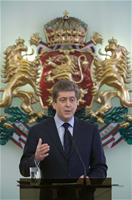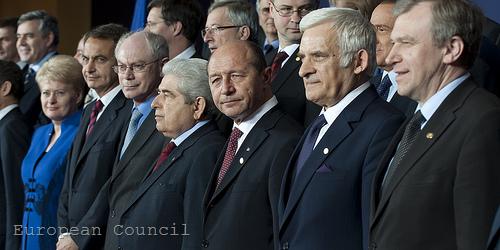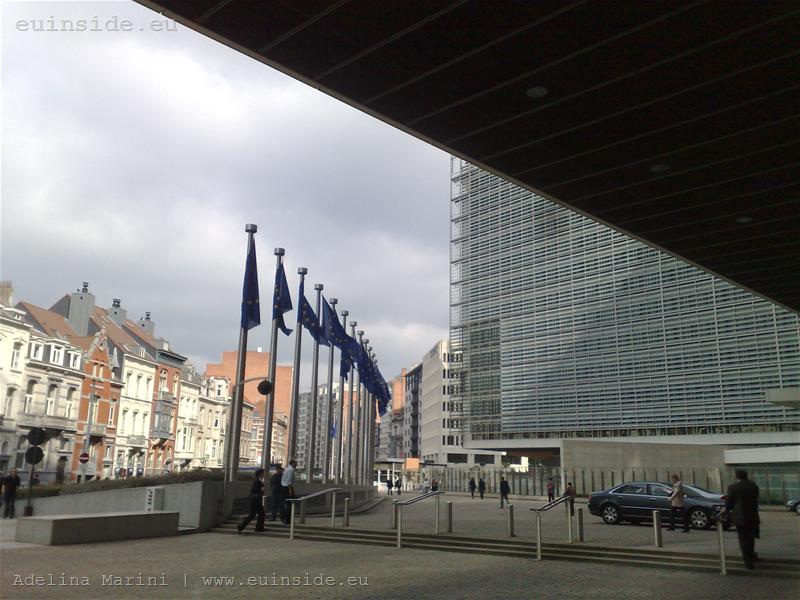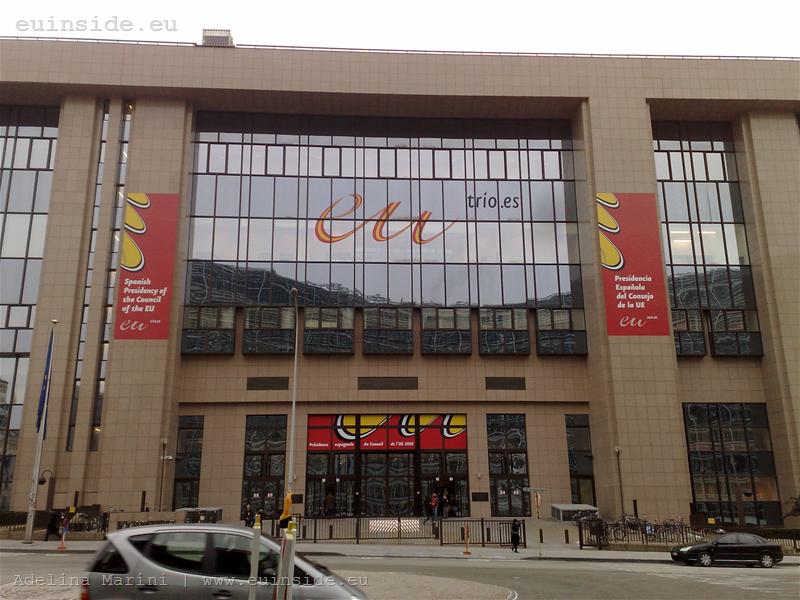The president of substitution
Adelina Marini, Ralitsa Kovacheva, March 15, 2010
 Although he made his first visit in Brussels 3 years after Bulgaria joined the EU, the president of the country Gheorghi Parvanov decided to show himself as a patron of the discussion on EU's latest economic strategy Europe 2020. On March 12th, Parvanov called a press conference, claiming it would focus public attention on the document. The choice of the date for the press conference is weird, given the fact that the strategy was presented 9 days before that (on March 3rd). This could be explained with the ongoing scandal between Parvanov and the deputy prime minister and minister of finance Simeon Dyankov.
Although he made his first visit in Brussels 3 years after Bulgaria joined the EU, the president of the country Gheorghi Parvanov decided to show himself as a patron of the discussion on EU's latest economic strategy Europe 2020. On March 12th, Parvanov called a press conference, claiming it would focus public attention on the document. The choice of the date for the press conference is weird, given the fact that the strategy was presented 9 days before that (on March 3rd). This could be explained with the ongoing scandal between Parvanov and the deputy prime minister and minister of finance Simeon Dyankov.
The real purpose of the media activity of the president becomes clear in the very beginning of his introduction (the third sentence), where he denounces the minister of finance: "Let me remind you that then we initiated a debate on the necessary anti-crisis measures with a report of experts, characterized, by the way, quite eloquently by the finance minister, who hadn't even read it".
We have no intention here to analyse the head of state's press conference. We want to focus on his vision of Europe 2020 strategy, for which the president claimed to the very last moment it was his most important issue. Because, obviously, unlike him, we are convinced in the significance of the topic and in the necessity of a serious public debate.
What impresses is that Gheorghi Parvanov did not betray his traditional manner to quote himself constantly, although it is obvious that there is no progress on any of his ideas of proposals. Even on his "priority" issue Europe 2020 the president indulged only to mention that he wanted to have a leading role in the debate on it: "I would like to focus your attention on the fact that the main thematic areas have already been published on Presidency's website: what kind of economy we should strive for, what structure it should have, because it is obvious that the Bulgarian economy would need restructuring, which should the new growth resources and development resources be by 2020, what model of social policy we should follow, etc. Because this is another very important aspect in the work on the European strategy 2020".
If you expected, as we did, to hear the president's answers to the questions he raised himself, you probably remained disappointed. In a search for the president's position on the strategy and its Bulgarian targets, we pass by several long paragraphs in his speech (severely criticizing the anti-crisis policy of the government), we finally find couple of words in the very end of his expose, which lasted 34 minutes.
"I am giving you as an example the requirement 3% of EU's GDP to be invested in science and research. Currently in Bulgaria we spend 0.3% of our GDP. How are we going to overcome this big gap if we want to have intelligent growth, if we don't want to be, again, at the end of the queue. Let us not forget that among the European targets there are such as 75% employment for the people, aged between 20 and 64 years. Here, the level of employment in this age range is 60%".
And that's it. And here is what we think the president should have done, if he really wanted to focus public attention to the strategy Europe 2020. As he is very right in putting an accent on science and research, instead of asking how Bulgaria would achieve 3% of GDP investments, the president could have presented a proposal of his own. Especially after he explicitly boasted with having a strong team of experts:
"I don't have self-confidence that the best experts are in the Presidency, although they work perfectly. I hope the government also does not think that only there the expert potential is concentrated. Now is the moment to really hold on to the knowing and capable people. This is the basic point of my message".
Besides, Gheorghi Parvanov in his capacity of having the Bulgarian analog of PhD in History, could have made specific proposals where these 3% of GDP to be invested - whether the Bulgarian Academy of Science (with or without reforms), the universities of something else. He could have presented the ideas of his team of experts on what principle science and research could be funded and which areas he considered as priority ones.
It could have been a demonstration of respect towards his voters and the taxpayers if he used his right of media performances in the public media to offer possible answers to the important for the country questions and not only ask them. Because, as it became clear, the president's position on the so important, as he claims, strategy 2020, was basically in asking questions.
Which leads to the obvious conclusion that the purpose of the president's media performance on Friday was different. Three quarters of the time of his expose the head of state spent in explaining what the government, and the finance minister Simeon Dyankov in particular, was not doing. Why then he bothered to hide behind Europe 2020? It is also interesting to know how does the Bulgarian president expect to provoke debates on this, indeed, very important European topic, since he was obviously underestimating it to a pure settling of accounts with the minister of finance Simeon Dyankov.
And on what grounds Parvanov lined up with the American president Barack Obama, the French - Nicolas Sarkozy and other European leaders, since he neither has their visions nor their constitutional powers? "In our September debate I raised the issue of the social price of the anti-crisis policy. This issue, which is basic for president Obama, president Sarkozy, all European leaders, is also a key issue in the already mentioned but not very discussed strategy Europe 2020".
The president reminded that he had discussed Europe 2020 with the European leaders in Brussels. However, he did not elaborate on the visions he presented there. And, given his large team, financed by the Bulgarian taxpayers, given the television and radio time, also financed by the taxpayers, the president owes some answers to the society, not questions. The questions are usually raised by the voters.
So, inevitably, we come to the issue about the questions. Those which the journalists asked and, especially those, they did not. This is part of the big topic about substitution. The way the president substituted the important topics with the non-important ones, the same way the journalists, present at the press conference, substituted the important questions with the convenient ones. Not all of them, of course. But the only possible strategy against a demagogue, like the president, was the journalists to unite around 3 important questions and keep asking them as many times as possible. Only then we could have received answers.
The journalists could have also protested openly and unequivocally against the president's phrase: "Since you don't receive an answer, then don't ask these questions anymore". And what are the questions, the society is to decide and the media are to raise and ask them. Not the president, the prime minister or whoever who might decide to use the media only to wave a finger, to settle accounts or to talk in a "one way direction".
Are we going to allow them to do this?
 | © European Council
| © European Council  | © euinside
| © euinside | © euinside
| © euinside | © euinside
| © euinside